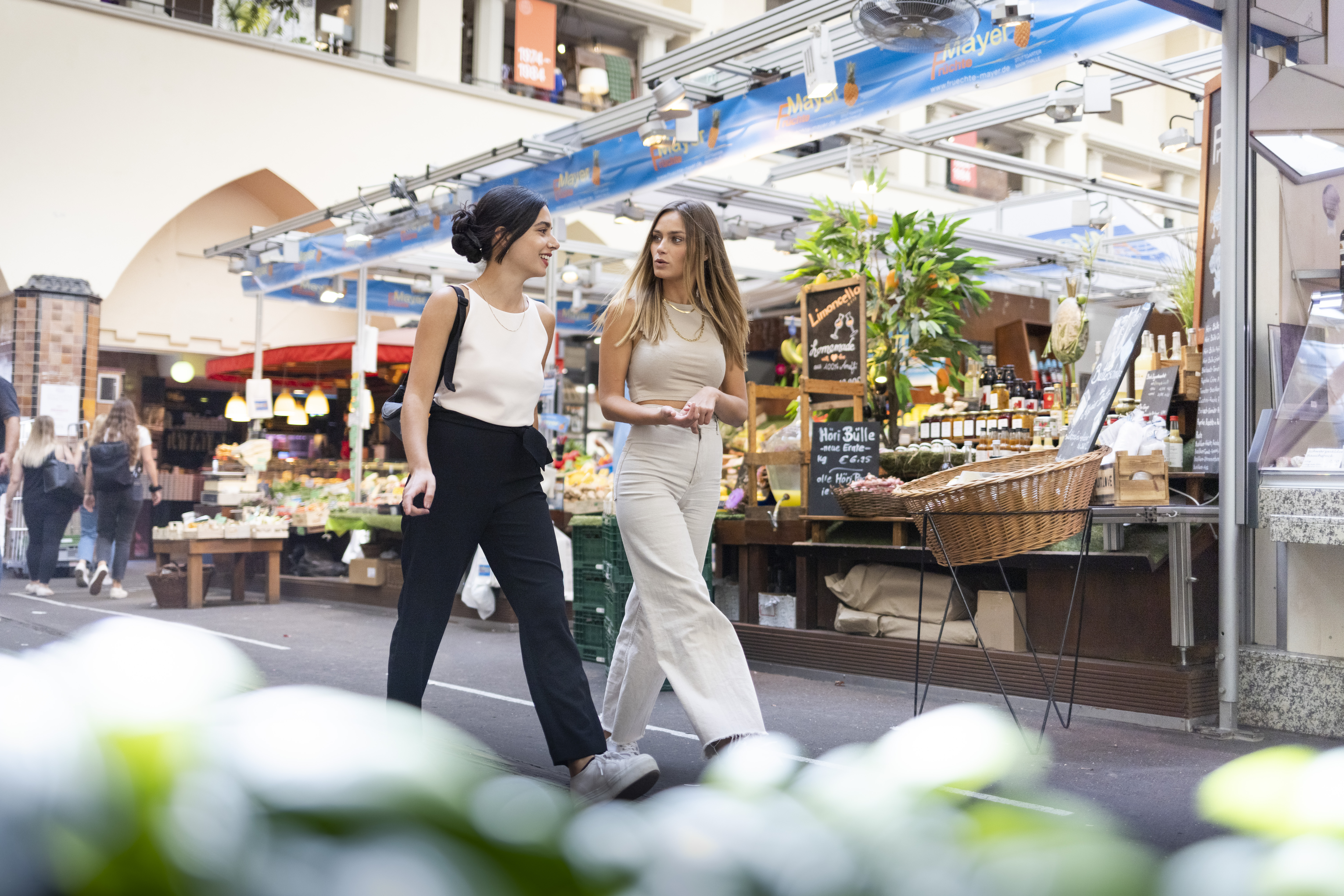Regional products and Swabian delicacies
IIn the Stuttgart Region people know all about enjoyment. Whereas Stuttgart was once known as the "chocolate capital of Germany", it now has a reputation far beyond the city boundaries as a wine-growing region.
Even if it is rarely remembered today, at the beginning of the 20th century Stuttgart was known as a "chocolate city". Waldbaur – famous for its chocolate "cats' tongues" – and the Moser-Roth and Eszet chocolate factories were located here. Ritter Sport has continued to thrive into the present day. In 1912 Alfred Eugen Ritter and his wife Clara founded a chocolate and confectionery factory in Stuttgart-Bad Cannstatt. In 1930 the company relocated to larger premises in Waldenbuch, where the company – over 90 years later – still has its headquarters. It was also Clara Ritter who devised the square-shaped chocolate bar. She had the idea of producing a chocolate bar that would fit into the pocket of a sports jacket without breaking, yet weighed the same as a rectangular bar – that was the birth of the original name "Ritter's Sport Chocolate".
In Stuttgart you'll find not only good chocolate, but also exquisite coffee. In the 1930s Gustav Hunzelmann brought coffee to Stuttgart: he opened his own coffee roastery at Königstraße 45. The company expanded and in 1968 moved to new, ultramodern premises in Stuttgart-Degerloch. Today, Josué Ruiz manages the company together with his sons, Joshua and Jonathan, representing the fourth generation of family leadership. In addition to coffee and two Holanka coffee bars in Stuttgart, Hochland has also had its own chocolaterie since 2010.
Barley or grape juice – beer or wine? Stuttgart can score with both. The Dinkelacker family brewery, founded by Carl Dinkelacker, has been brewing beer in Stuttgart for 130 years now. In 1900 it was also the first brewery in Stuttgart to produce a type of beer brewed in the Pilsner tradition, now known under the name of CD-Pils. Some years previously Ernst Immanuel Wulle had founded his brewery of the same name. In 1971 the brewery was taken over by Dinkelacker, and in 2008 the cult beer "Wulle" reappeared on the market.
In the Stuttgart Region wine is a dominant theme. There's plenty of choice, with wines ranging from Lemberger to Syrah and from Chardonnay to Riesling. The state capital of Stuttgart is the only German metropolis with its own municipal wine estate, with around 16 hectares spread over nine different locations. In Stuttgart vineyards occupy a total area of 420 hectares, making Baden-
Württemberg's state capital one of the leading wine-growing cities, like Vienna. For those who'd like to enjoy the local wines in their own home, a large selection can be found at Feinkost Böhm, the Market Hall and Weinhandlung Kreis.
Vineyards also define the region's landscapes and look back on a long tradition. This is what attracted Georg Christian Kessler to settle in Esslingen in 1826, where he founded Germany's first sparkling wine factory – now the oldest in Germany. In mid-October 2021 Kessler opened its first flagship store in Germany in Stuttgart's Calwer Straße. Kessler sparkling wines and limited editions are on sale in the heritage-protected building. Next to the shop is the Kessler sparkling wine bar, which also includes an outside area.
A new trend has joined the long tradition of viniculture: whisky distilling. The Stuttgart Region already has numerous distilleries where this "liquid gold" is produced. Günther Busch was the first distiller in Stuttgart to attempt a Swabian Single Malt. His family is now producing high-proof spirits in the fifth generation, making the Busch distillery the oldest in Stuttgart.
In addition to whisky, gin has also become increasingly popular in recent years. There are now several distilleries in the Stuttgart Region making this spirit flavoured with juniper berries. The trailblazer was Applaus Stuttgart Dry Gin, which contains a total of 24 selected botanicals and is produced by hand. Ginstr Stuttgart Dry Gin joined the list of regional varieties in 2016. It contains 46 botanicals and has a fresh, fruity aroma with slight hints of rosemary. In 2021 – for the second time since 2018 – Ginstr was the World Spirits Award gold medal winner, and also received the Gin and Tonic Trophy of the IWSC (International Wine & Spirit Company) in London.
Another protected speciality within the European Union grows on the fields of the Filder plateau: Filderspitzkraut. This tasty variety of pointed white cabbage has been grown on the Filder plateau for centuries, because it only thrives on good, clayey loess soil. The regional delicacy is used in a variety of dishes, including sauerkraut, stuffed cabbage leaves and cabbage tart. These can be enjoyed at the annual Cabbage Festival in Leinfelden-Echterdingen and at other local events.
Carefully selected products from the Stuttgart Region that stand for quality, creativity and culinary excellence: the range available at the Tourist Information centre in the House of Tourism brings together the very best from Stuttgart and its partner municipalities – from culinary specialties to thoughtfully designed souvenirs.
